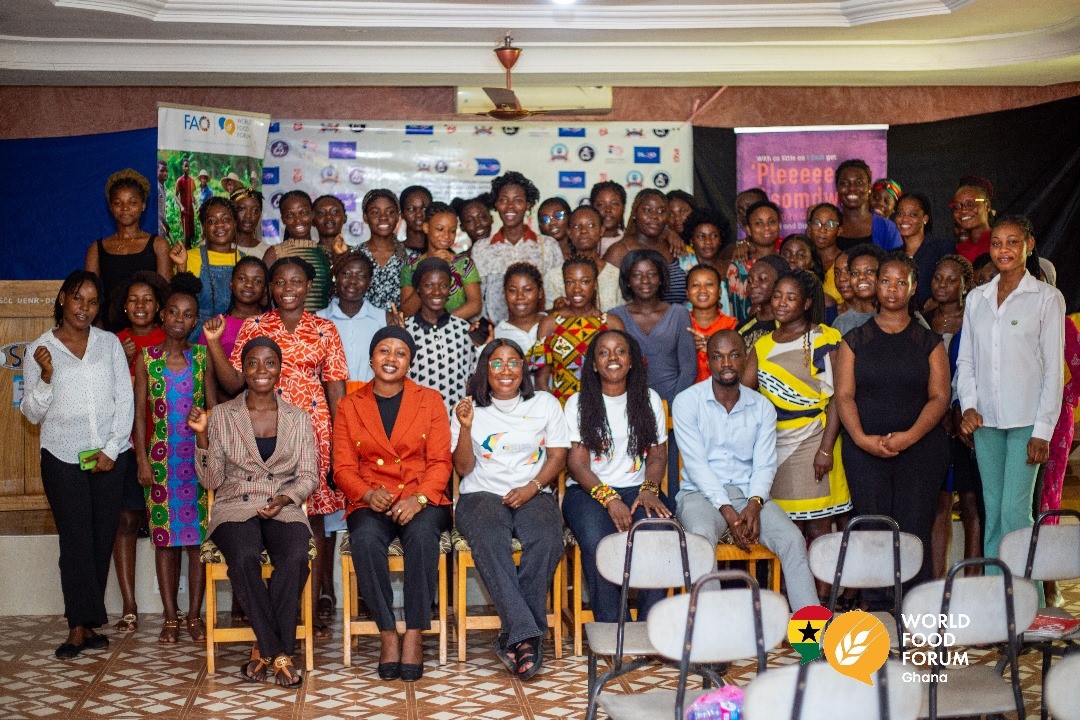On July 18, 2025, the university of Energy and Natural Resources in the Bono Region of Ghana, became a hub of inspiration and synchronizing of energies and passion, as the World Food Forum (WFF), Ghana chapter in collaboration with UENR’s office of women’s commissioner, hosted a practical forward-thinking dialogue, with a thematic focus on, “what it takes to empower the young Ghanaian woman in Agri-food systems, through Youth-led actions
As more young women actively venture into agriculture agribusiness, adding value to produce and bringing creativity and innovation to bare across Ghana, their increasing involvement is steadily bringing awareness to the role women can play, whiles demonstrating their transformative position within the nation’s agrifood systems growth.
However, numerous challenges continue to limit the young woman’s ability to harness her full potential, inclusive participation, growth, and advancement within the sector.
To address these pressing gaps and further contribute to amplifying the voices of young women within the agrifood systems, the World Food Forum (WFF) Ghana Chapter, together with the women’s commission of the University of Energy and Natural Resources (UENR), brought together about one hundred and fifty (150) young women start-ups, students within agriculture, food and nutrition disciplines, beginner agribusinesses and agripreneurs, for an engaging session, highlighting the root causes, challenges and recommending youth-led approaches to be adopted, to empower women in food systems.
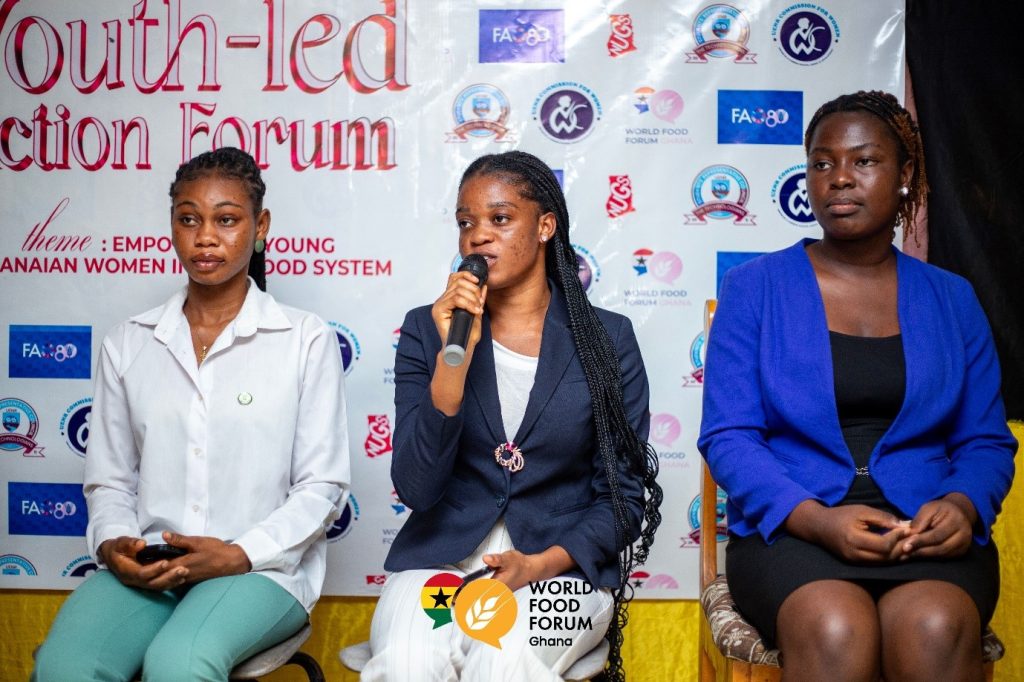
The session opened with Seven (7) vibrant agricultural discipline student panellists; Alberta Obeng, Juliet Adu Nketia, Vida Fakornam Agbetsiafa, Rosemond Koto Deladem, Pearl Seyram Adoboli, Bernice Donkor, and Beatrice Yayra Asamani, who themselves have developed and run their respective innovative start-up agribusinesses.
Each panellist offered a unique and compelling perspective, through experiences as young women in the food and agricultural value chains, underscoring the urgent need to deepen research, advocate for gender policy reviews and further push for the adoption of strategies and activities, that could further support empower, attract and innovatively support to sustain and scale-up young women’s active participation and sustenance within the food and value chain system
Among the key challenges identified were the lack of mentorship activities and platforms, limited access to funding, insufficient networking platforms, unfriendly gender policies and limited women centred educational activities. Others included the environment and cultural expectations, low self-confidence among women, societal discouragement particularly affecting young women in the sector, lower publicity in educational programs that offer empowering sessions for women in agribusiness, limited access to materials, manuals and resources, lack and continuous shortage of raw materials, hindering their sustenance in adding value to produce, and market inflation, among others.
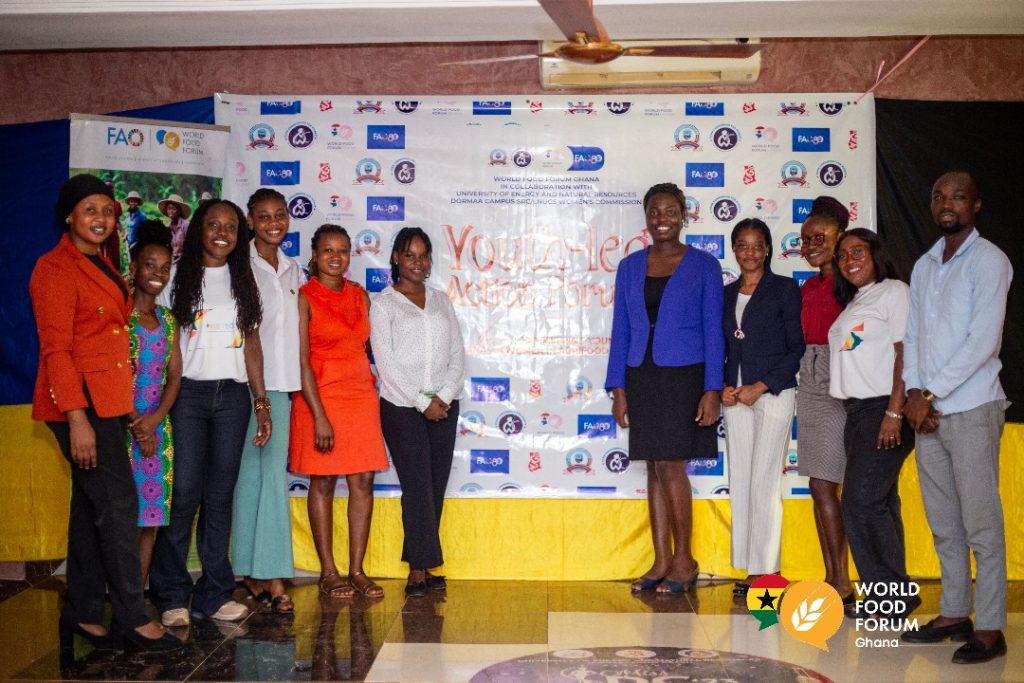
“Many young women within my cycle have creative bankable ideas and desire to venture into agriculture, but the lack of mentorship and supportive networks holds them back,” said Pearl Seyram Adoboli, a BSc Agriculture student. “Forums like this give us the courage to speak up and the clarity to see a path forward.”
Bernice Donkor, a Food Technology student and co-founder of BKB Foods, emphasized the emotional and cultural obstacles women face: “Sometimes it is not just about funding or tools it’s about the mindset. We are told farming is not for women. That narrative must change.”
Vida Agbetsiaf, a level 200 food technology student, had this to say, aside from schooling, I actively contribute to the agrifood sector, through small scale food processing. I currently sell baked products and I process juice from locally available mangoes. This initiative was inspired by my desire to reduce post-harvest losses and create value-added products from local fruits. I am however faced with financial constraints to scale-up, access to proper equipment to process and store. I am not even privy to mentorship programs of this nature. I also have very limited business skills.
She recommended that Mentorship and Training, from experienced professionals in the agrifood space is critical. Young food processors like myself need guidance to grow and scale sustainably.
She also highlighted the need for Start-up Support, including access to start-up capital, processing equipment, and proper storage facilities that would significantly boost productivity and product quality for young women.
Vida is also convinced that entrepreneurship Education: Providing financial literacy and business development training, especially on how to write and implement business plans will empower more youth to pursue agrifood ventures with confidence.
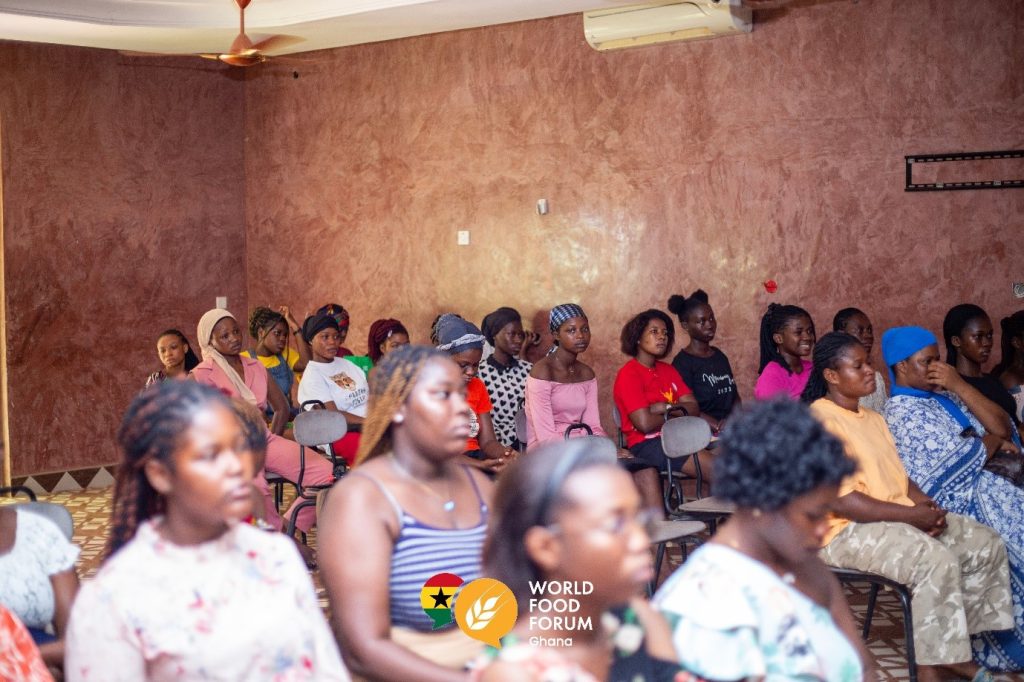
If more young people are educated on the potential within the agrifood system, I believe they will actively get involved, contributing to national food security and reducing hunger. I also recommend that the government and NGOs offer grants, scholarships, and soft loans to support youth-led initiatives. Additionally, policies that promote and ease agrifood start-up operations should be put in place to encourage innovation and reduce barriers to entry.
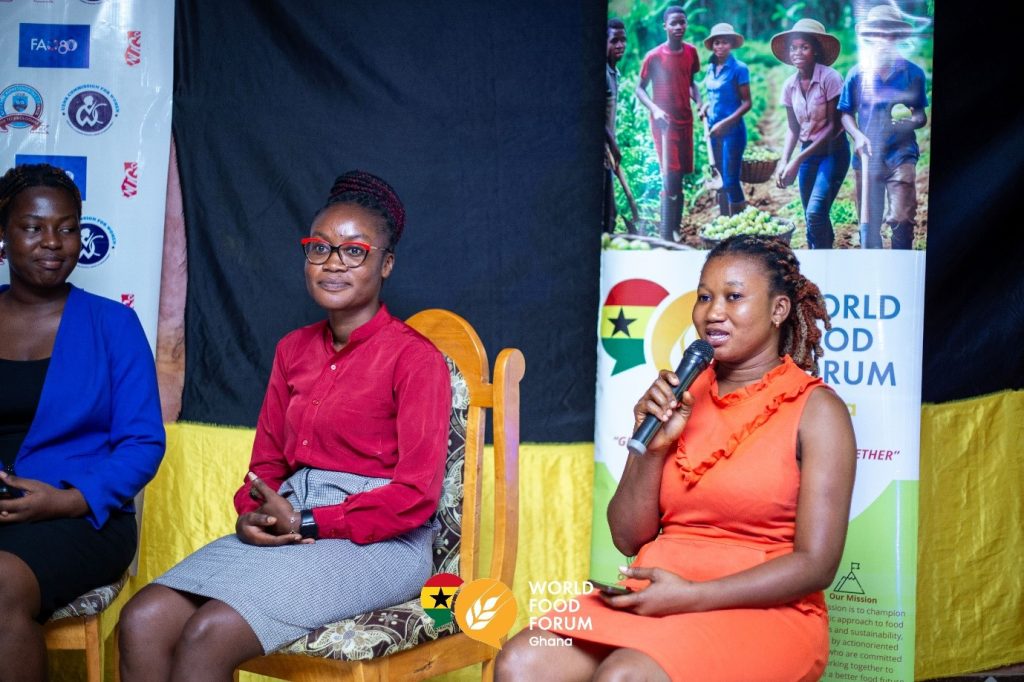
Beatrice Asamany, a multifaceted student leader and the co-founder of BIAQ Golden Cycle (A startup into the production of carrier oil and butter from mango seeds which helps reduce mango waste and help mango farmers earn additional income on waste mangoes), recenty ventured into developing a sustainable business model for producing dehydrated tomatoes to reduce post-harvest losses in tomatoes, highlighting her commitment to innovation and environmental responsibility, shared her challenges which largely centred on Limited networking and mentorship opportunities and operational funds
Beatrice believes, encouraging and empowering women into agriculture through networking, new market access opportunities and mentorship is the key way to building a vibrant food system, with young women at the center.
Anita Ampomaa Oduro, also Food Technology student, who alongside produces and sell fruit drinks and cookies highlighted lack of brand awareness and trust building around her products has taken up a major part of her investment, time and resources.
Alberta Obeng, the founder of OSAA Agrochemical Shop and a final year student at the University of Energy and Natural Resources reading Agribusiness and the 2025 ultimate winner of the Input Dealer Pitch Competition in Ghana, feels proud and excited to be among very few of the young ladies nationally, promoting women in input business. Alberta recommended that educative programs and training sessions should be brought to local and rural communities to equally benefit the youths and students in such areas.
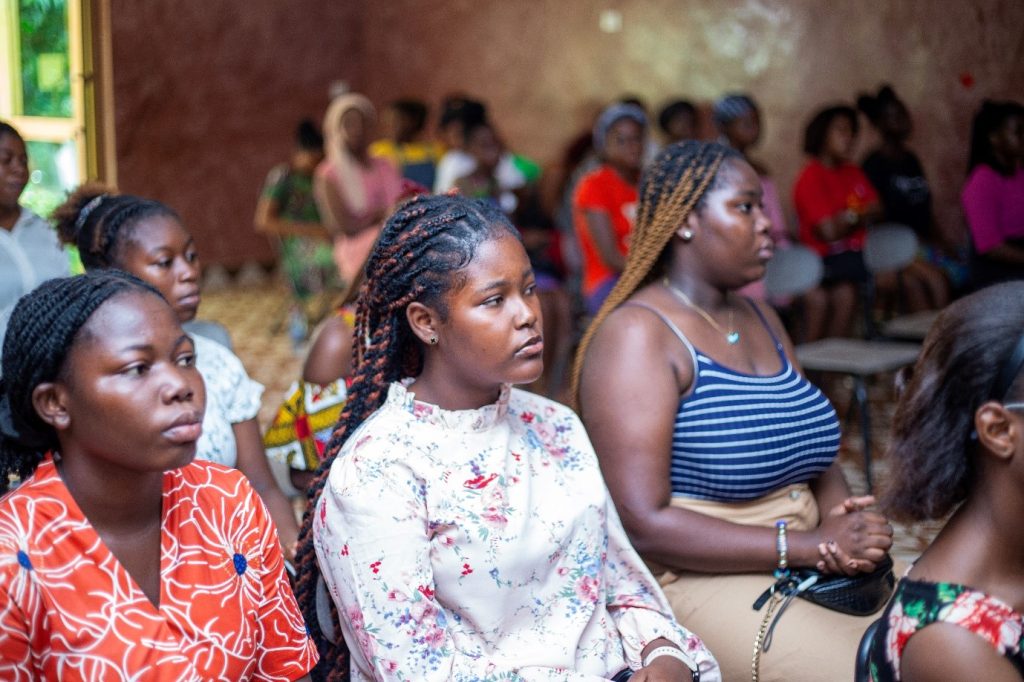
Clementina Owusuaa Ama, a Food Technology student. I have a passion for the agrifood sector, who is currently exploring the potential of cashew nuts for snacks and biscuits, as well as processing cocoyam leaves into a usable paste, spoke of her passion and interest in food innovation to reduce post-harvest losses and promote sustainable food systems.
According to her, some of the challenges she faces includes the lack of infrastructure and resources for accessing, processing and preserving cashew fruits and cocoyam leaves. Most people in my community do not consume cashew fruits, leading to significant post-harvest losses. Additionally, cocoyam leaves are often underutilized despite their nutritional value. I also face challenges in accessing funding and technical support to develop and market these products,
Clementina believes, increased investment in infrastructure and equipment for processing and preserving local crops like cashew fruits and cocoyam leaves will be helpful within local communities.
Additionally, capacity-building programs and training for young food technologists and entrepreneurs on value addition, product development, and marketing will be a useful tool.
knowledge of access to funding and grants for innovative projects that promote sustainable food systems and reduce post-harvest losses, she believes, will shape the future of young food innovators
She also highly recommended a stronger collaboration between academia, industry, and government to promote research and development in the agrifood sector.
“By addressing these challenges and implementing these recommendations, I believe we can unlock the potential of local crops, promote sustainable food systems, and empower young food technologists and entrepreneurs in Ghana”, she concluded
In response, the students made several forward-looking recommendations. These included establishing structured mentorship and leadership development programs, creating youth-inclusive agricultural networks, improving access to funding, and launching confidence-building initiatives tailored for young women. They also stressed the need to challenge gender biases through education and sustained community outreach.
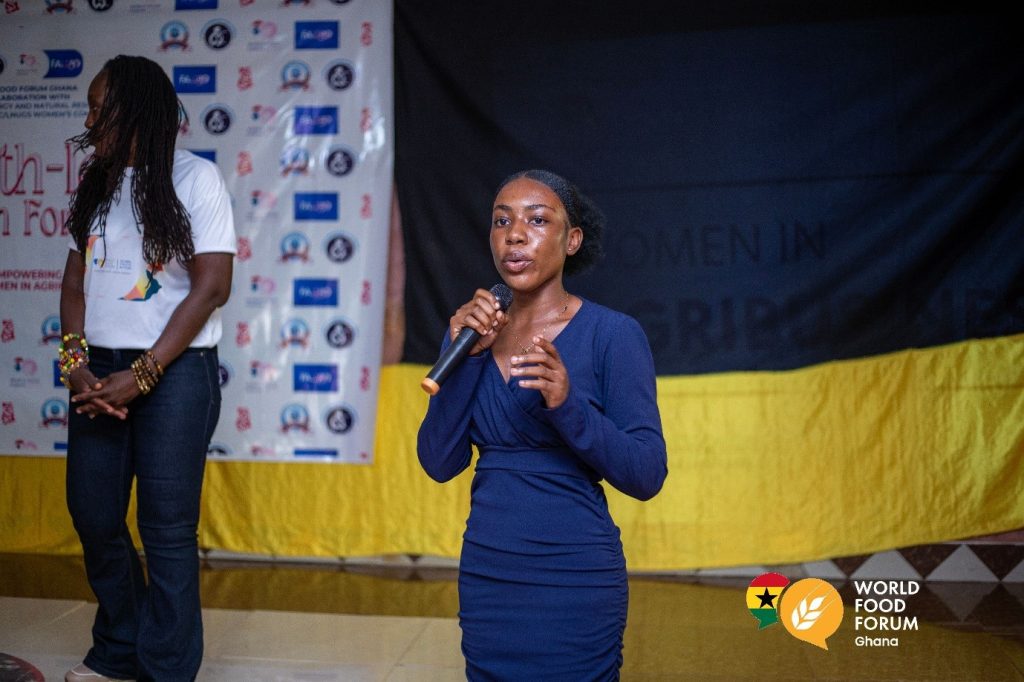
In her submission, Alberta Nana Akyaa Akosa, National Director of the WFF Ghana Chapter, reaffirmed the organization’s dedication to building inclusivity for youth and women
“At the core of the World Food Forum is the belief that youth and women are not just participants but vital architects of our agrifood present and future. Our creativity, resilience, and leadership must be harnessed if we are to build equitable and sustainable food systems in Ghana and globally.
We are committed to creating spaces like these that elevate our collective voices and equip us with the knowledge and tools to lead and take charge in the agrifood system”
This forum has indeed produced real evidenced based feedbacks. It has additionally delivered on providing a much-needed atmosphere, where we have freely opened-up; made submissions and shared experiences case studies, built on our journey as young women, building businesses.
It has also aided to bring to the fore, a shared commitment and a burning desire among us all, to be active participants in contributing to Ghana’s food security and agricultural development, through appropriate innovations, interventions, digital approaches, Alberta added.
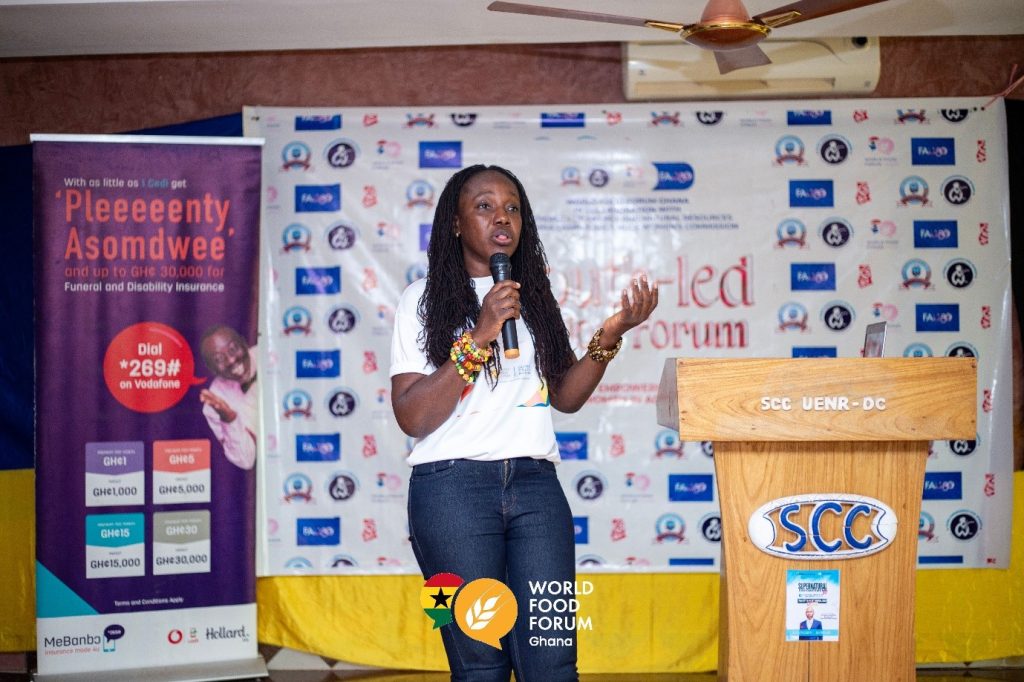
She announced that the recommendations presented will support to lay a foundation of pilot initiatives by the WFF National Youth Chapters. These initiatives will be implemented as part of the International Year of the Woman Farmer in 2026, a strategic milestone aimed at elevating the roles of women and youth in food systems.
We appreciate your open-mind-set and emphasis made on the intersection of youth-led innovation, gender equity, and the structural barriers hindering entry and success of women in agriculture and these recommendations will also go a long way in shaping our gender activities as a World Food Forum Ghana chapter, Alberta concluded.
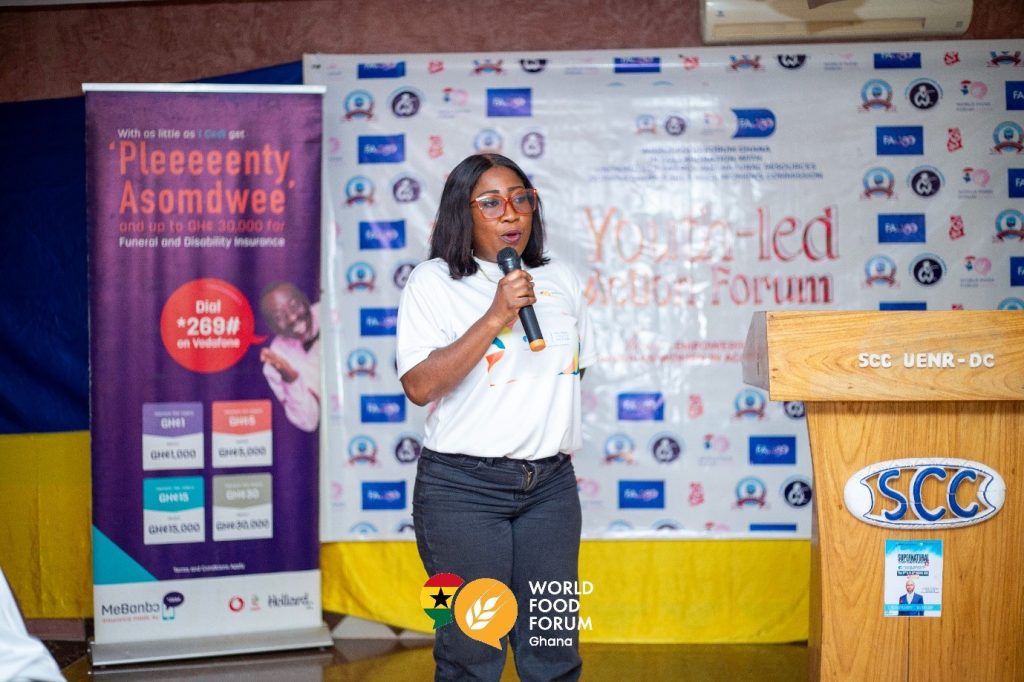
The Director for Women and Social Protection at WFF Ghana, Mrs. Phillipa Mensah who led and moderated the panel conversation encouraged students to remain bold and proactive:
“You are not just future farmers you are present-day changemakers. Embrace your identity and the growing momentum that’s behind young women and men in agriculture. Your voices, actions, and innovations matter.”
She noted that WFF Ghana is currently rolling out localized, impactful strategies aligned with the global agenda of promoting equity and resilience in agrifood systems, with a strong focus on youth and gender inclusion.
Addressing students via a video message from the headquarters of the Food and Agriculture Organization (FAO) of the United Nations, Amanda Mrad, a Youth Local Action Team member at the Office of Youth and Women at the World Food Forum (WFF), emphasized the urgent need to advance women’s empowerment in agrifood systems through youth led action.
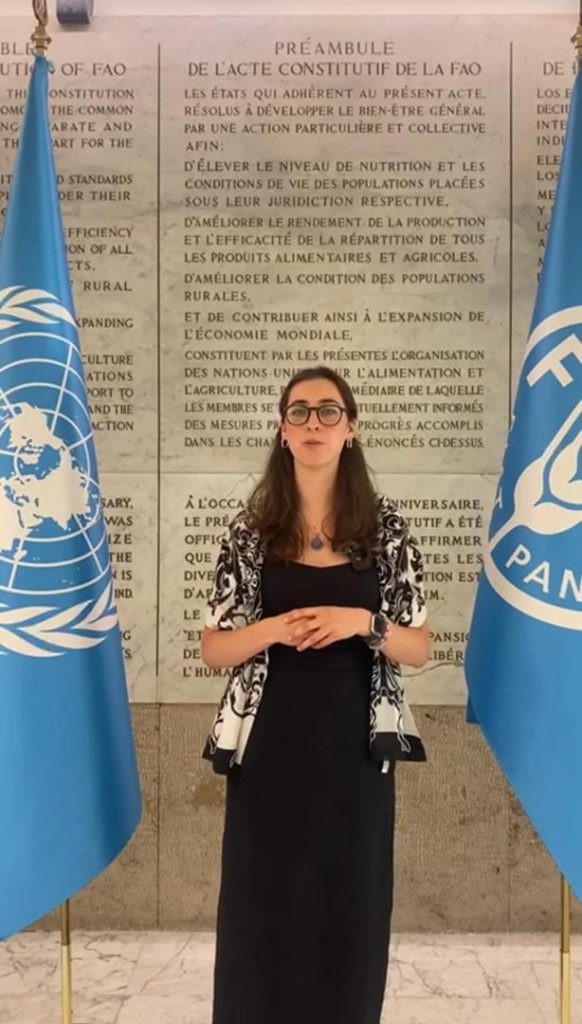
She acknowledged the historical underrepresentation of young women in policy and decision-making spaces, highlighting how their unique challenges and diverse identities have too often gone unheard. “Empowering young women is not just a mission, it is a core pillar of our work at the World Food Forum,” she emphasized.
“It is deeply encouraging to see so many young women gathered, engaged, inspired, and committed to shaping the future of agriculture. You are not only vital to our agrifood systems; you must be at the very center of the decisions and actions that shape them,” she said.
She further explained that since January 2025, the WFF Youth Assembly has led a global, youth driven consultation process, gathering insights from youth leaders, subject matter experts, policymakers, and national youth chapters, including those in Ghana.
The objective was to define concrete pathways for empowering young women in agriculture using an integrated and intersectional framework, connecting Sustainable Development Goals (SDGs) 2 (Zero Hunger), 4 (Quality Education), 5 (Gender Equality), and 8 (Decent Work and Economic Growth).
“Earlier this year, we invited you to share your experiences and perspectives on empowering young Ghanaian women in agriculture, and your voices were heard. Your insights helped shape a global blueprint for action that will guide future policies and initiatives.”
Looking ahead, she underscored the crucial role National Chapters will play in translating these global recommendations into local realities.
She commended the Ghana Chapter for its impactful leadership and grassroots engagement. “From organizing young farmer forums to hosting traditional market symposiums, you are proving that youth led action is not only possible, it is transformative.”
“We are honored to walk this journey with you. Your energy, leadership, and commitment are laying the foundation for a more inclusive and resilient agrifood future for Ghana and for the world.”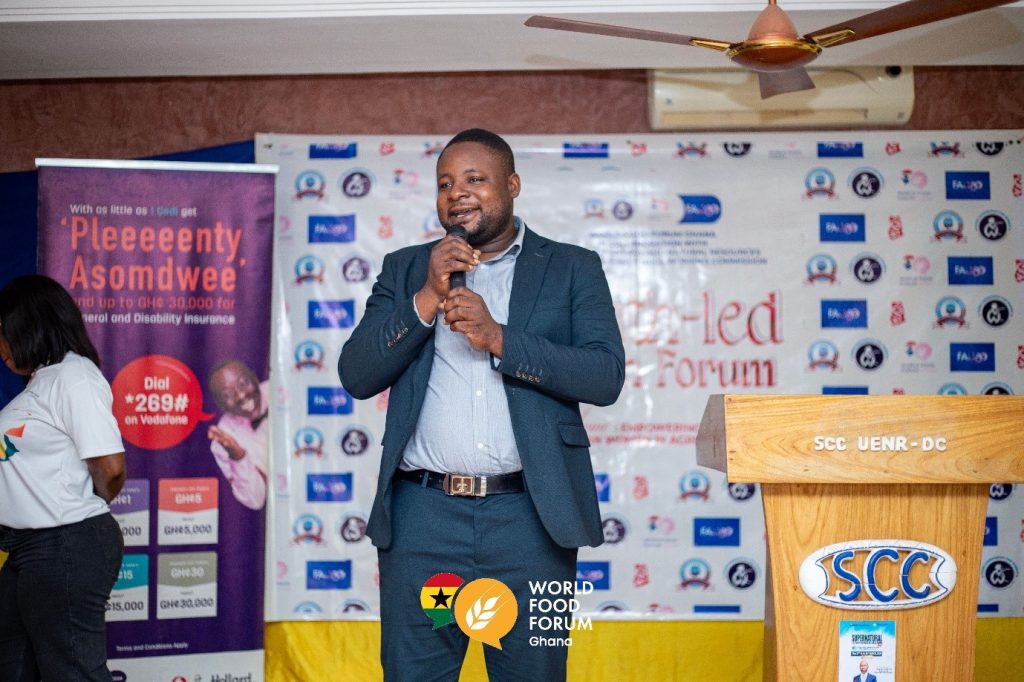
Mr. Ernest Bachela Mbawini, Assistant Registrar of the School of Agriculture and Technology at UENR, also reaffirmed the university’s commitment to deepening collaboration with WFF Ghana. He pledged to integrate more hands-on agricultural experiences into the academic curriculum and support student-led agribusiness ventures both on and off-campus.
Through open dialogue and grassroots-led solutions, the World Food Forum Ghana Chapter is nurturing a new generation of women innovators in agriculture. As these student-led ideas evolve into actionable pilot projects, they hold the promise of redefining the country’s food systems making them more inclusive, sustainable, and youth-driven. By investing in the energy, ideas, and leadership of young people especially women, Ghana is not only shaping its agrifood future but contributing meaningfully to a global movement toward food equity and resilience.
About the World Food Forum
The World Food Forum Ghana Chapter under the auspices of the World Food Forum facilitated by the Food and Agriculture Organization of the United Nations, is a dynamic youth-led initiative aimed at transforming agri-food systems in Ghana.
The chapter is committed to leveraging the enthusiasm and innovative capacities of Ghanaian youth to enhance food security, promote sustainable practices, and influence agricultural policies. By connecting young minds with global networks and local resources.
The WFF serves as the premier global forum to harness the passion and power of Ghanaian youth to identify solutions and incite positive action for agrifood systems.

